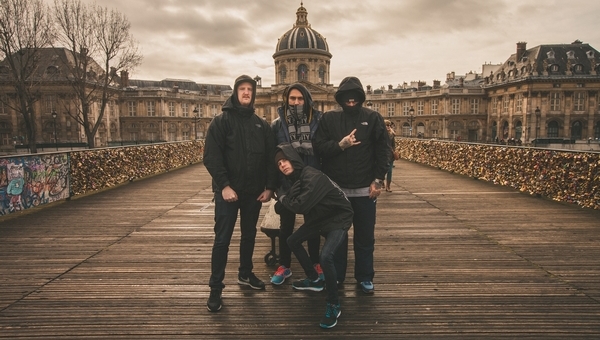Before its release in June, major music retailers around the world refused to stock Holy War, forcing the band to submit a revised cover image. The artwork rejection perhaps isn’t such a surprise, but the band was determined to not compromise their creative and ideological vision. Thus, while the bombs were removed from the front cover, the original image revealed itself once fans unfolded the album booklet.
Such backlash is understandable, but attracting controversy isn’t Thy Art Is Murder’s chief intention. They’ve got a potent message to communicate, and an audacious spirit leading them to such extravagant measures. Beat speaks to guitarist Andy Marsh about the new album and surrounding controversy.
“The intent behind the record as a whole; as a piece of art – music, lyrics and physical artwork – was all designed to generate some sort of discussion,” he says. “Whether that’s the by-product of someone taking offence or someone taking intrigue doesn’t bother me, as long as it is generating some discussion. So I definitely think you can design a record to stir emotion within other people, as long as it stirs something within yourself.”
Censorship occurs when the powers that be deem something inappropriate or potentially dangerous. However, at its core, Holy War seems to have a constructive aim. Although people love to focus on controversy, the band have tried to re-focus attention on their original message.
“I definitely exploited the element of controversy to draw attention to the record, and I feel like we backed it up by delivering a good record that is full of vicious intent and very, very good delivery,” Marsh says. “If it had’ve been some record that had no message that was backed up by any sort of meaning or conviction, then I could understand how we could all sit around and laugh about it as some sort of controversial album release to generate CD sales. But it isn’t. CD sales are a by-product of stirring emotion within the listener, because people will always flock to what is real. I feel that kids can generally tell when something is too put on or too rehearsed.
While the record’s marked by heavy themes and CJ McMahon’s deep-throated screams, perhaps the most vicious ingredient is Marsh’s guitar playing. Marsh has been known to make many other guitarists jealous due to the seeming effortlessness with which he plays. To add insult to injury, he spends very little time fine-tuning his guitar playing technique.
“I deliberately did not practice guitar before going into record [Holy War],” he says. “I practiced for a few days before the last record, and I felt some of the stuff on that record was a little bit faster and shreddier. This time I deliberately didn’t practise so my hands would be a little bit more clumsy and I’d be forced to play slower. That’s not to say that I am lazy, because I definitely work hard. But I think that’s a creative element – forcefully denying yourself certain things to make you perform in a different way or generate different ideas.”
BY AUGUSTUS WELBY







